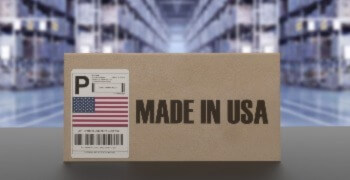
Can gold and silver protect the people of Maine from inflation? Wacky Tax Wednesday
One of the perks of my job is that I get to read, or at least skim, a lot of different pieces of legislation. The titles of the bills are often … surprising. Case in point: LD 1051, An Act to Protect Maine People from Inflation by Exempting Gold and Silver Coins and Bullion from the State Sales and Use Tax.
Inflation is both real and necessary. The Federal Reserve believes a long-term inflation rate of 2% is ideal, while “inflation that is too low can weaken the economy.” Yet at 5.7% and 5.5% respectively, inflation rates in 2021 and 2022 were well above the 2% target. Higher prices — and the sales tax on higher prices — put a dent in the wallets of many consumers.
Could exempting gold and silver coins and bullion from Maine sales tax truly protect Maine people from inflation?
I was eager to see how it would work and tucked into the bill with enthusiasm. But after such a promising title, the measure was surprisingly short on words. It merely adds a new exemption to the list of exemptions found in 36 MRSA §1760: “Beginning January 1, 2024, sales of gold and silver coins and bullion.”
Fortunately, testimonies from a public hearing on the bill offer more color.
Exempting gold is necessary
Senator Eric Brakey submitted testimony to “illustrate the necessity of this legislation.” He began with an analogy: “If a Category 5 hurricane was careening towards our coast, would it not be prudent to eliminate taxes on the sale of life rafts to empower Maine people to prepare for the potential disaster?”
Many states do provide a temporary sales tax exemption for disaster preparedness supplies in the form of a sales tax holiday or tax-free weekend. But Maine isn’t one of them, and LD 1051 isn’t trying to create a Maine tax-free period.
So why bring up hurricanes and life rafts to support a gold and silver exemption? Because an economic crisis is coming, according to Brakey, and exempting gold and silver and bullion from Maine sales tax would help the state “prepare for a potential tsunami of inflation.”
Gold and silver have been “preferred forms of money” for thousands of years, he explained. Their divisibility, durability, portability, and uniform quality make them “uniquely effective stores of value and mediums of exchange,” and their value has remained remarkably stable. “It is often said that in the Roman Empire, an ounce of gold could buy you a well-tailored toga,” he added as an aside. “Today in America, an ounce of gold can buy you a well-tailored suit.”
But how many people have an ounce of gold?
“For the common man or woman,” continued Brakey, “owning gold and silver coinage and bullion is one of the most accessible, proven, and safe methods for protecting savings from inflation.” Exempting gold and silver from sales tax would remove “a significant barrier that prevents Maine people from protecting their savings.” It would also “help alleviate pressure on the ongoing shortage of affordable housing.”
Perhaps. About 10.8% of Americans own gold, according to a 2020 survey by Gold IRA Guide. Most Americans own neither gold nor silver. Those that do may own shares of a gold or silver fund in addition to (or instead of) physical bars and coins; they’re easy to trade and less likely to be lost or stolen. Brakey could have argued that physical gold and silver shouldn’t be subject to Maine sales tax because gold and silver funds are exempt.
Instead, Brakey’s testimony moves from the collapse of the Roman Empire, to the creation of the gold standard in the United States, to President Nixon’s ending the dollar’s convertibility into gold, and beyond. Other supporters were similarly descriptive in their testimonials, one claiming that an ounce of gold today will buy about 350 loaves of bread, “exactly as much bread as it would have bought you in 400 B.C. under the reign of King Nebuchadnezzar.”
As Brakey and others observed, few states tax the sale and use of gold, silver, and bullion today. Over the past seven years, Alabama, Indiana, Minnesota and several other states opted to exempt some or all sales of gold, silver, and/or bullion, though Alabama’s exemption is slated to expire in 2028.
If the governor of Mississippi signs Senate Bill 2862, Mississippi will exempt sales of coins, currency, and bullion starting July 1, 2023.
While most of the people who submitted testimonies to the Joint Standing Committee on Taxation on March 28, 2023, support the proposed exemption, one doesn’t.
Exempting gold would erode the sales tax base
Michael J. Allen, Associate Commissioner for Tax Policy at the Department of Administrative and Financial Services testified against the measure. After acknowledging the fiscal impact of LD 1051 would be “relatively small,” he pointed out that it’s one of many bills seeking a new sales tax exemption under consideration this session. “In the aggregate, these exemptions would continue to erode an already narrow sales tax base,” he cautioned.
Yet should the committee decide to advance the bill, Allen advised them to add definitions for “gold and silver coins,” and “bullion.” He also suggested the committee define “gold coin” and “silver coin” in terms of grade, purity level, or elemental content. He said some states provide an exemption only for sales of bullion worth more than $1,000.
Allen observed that past bills seeking to exempt gold and silver from Maine sales tax all failed. Like its predecessors, LD 1051 failed to garner the support needed to become law before the 2023 Maine Legislative Session adjourned on March 30.
Several other sales and use tax exemptions up for consideration in Maine also failed to become law by the end of the 2023 session. These include:
Changing taxability laws complicate sales tax compliance for businesses
Keeping track of new sales and use tax exemptions and other product taxability changes across the states is a big job. Hundreds if not thousands of taxability changes are introduced in legislatures each year, and every year, some become law.
Automating sales tax compliance helps businesses exempt sales tax for products that should be exempt and properly tax those that should be taxed.

Avalara Tax Changes 2026 is here
The 10th edition of our annual report engagingly breaks down key policies related to sales tax, tariffs, and VAT.
Stay up to date
Sign up for our free newsletter and stay up to date with the latest tax news.















